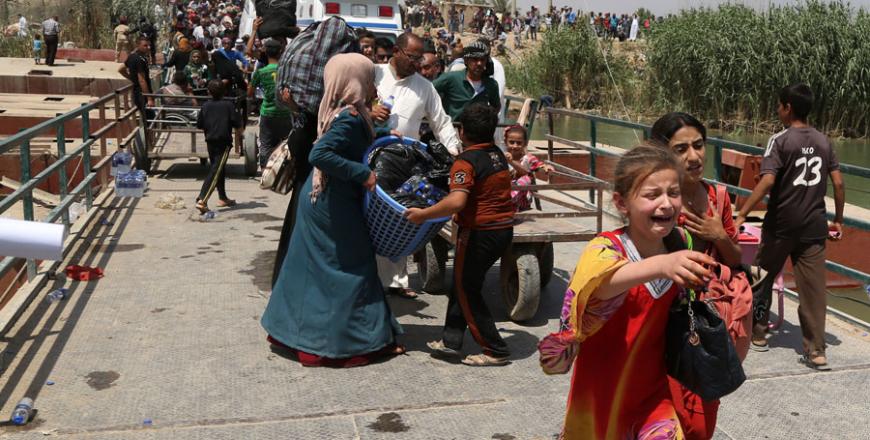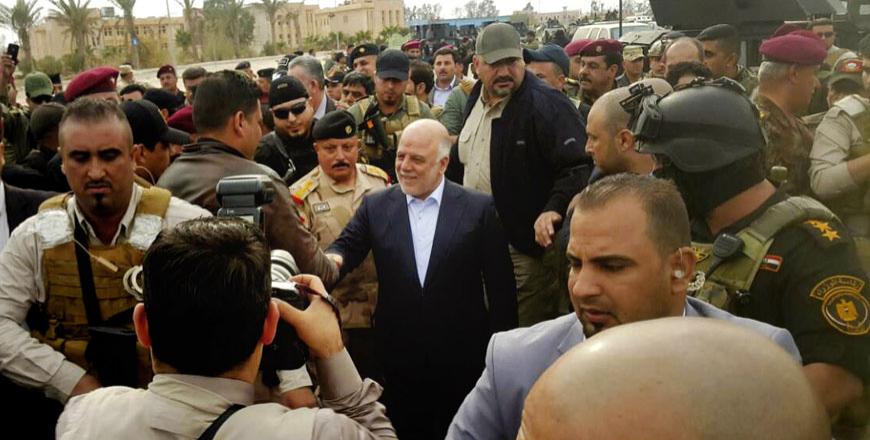You are here
Obama mulls enhanced support for Sunnis after Iraq rout
By AFP - May 20,2015 - Last updated at May 20,2015

Displaced Iraqis from Ramadi cross the Bzebiz Bridge fleeing fighting in Ramadi, 65km west of Baghdad, Iraq, on Wednesday (AP photo)
BAGHDAD — The United States said it is considering accelerating the training and equipping of Iraqi tribal forces to fight the Daesh group after the fall of the city of Ramadi.
The jihadists' capture of city was their most significant victory since mid-2014 when they conquered swathes of land, sparking a US-led air campaign to support Baghdad.
Besides the more than 3,000 air strikes carried out so far, Washington has supported a deep reform of Iraq's army and offered training to Sunni tribal fighters to retake their own provinces.
But that approach failed to prevent the fall of Ramadi, where militias backed by US arch-foe Iran will now take the lead in any counter-attack and reinforce their influence in Iraq.
US President Barack Obama huddled Tuesday with his national security team at the White House but signalled no change of tack, despite mounting calls for a more decisive approach.
"There is no formal strategy review," National Security Council spokesman Alistair Baskey told AFP after the meeting, which included the CIA and Pentagon chiefs.
"We are looking at how best to support local ground forces in Anbar," he said, "including accelerating the training and equipping of local tribes and supporting an Iraqi-led operation to retake Ramadi”.
There was no suggestion, however, that weapons would be sent directly to tribal fighters opposed to Daesh in Anbar province, of which Ramadi is the capital, instead of via the central government in Baghdad.
"This defeat was avoidable. Neither Daesh [Islamic State] nor any other Al Qaeda offshoot has ever taken a major urban area actively defended by the United States in partnership with local forces," the Institute for the Study of War wrote in an op-ed published in the Washington Post.
“This is what happens when a policy of half-measures, restrictions and posturing meets a skillful and determined enemy on the battlefield,” it said.
The United States has sent thousands of military advisers to train Sunni tribal fighters and help reform Iraq’s shambolic army, but the pace of change has failed to match Daesh’s aggressive military tactics.
Role of Iran
After the capital of Iraq’s largest province fell to Daesh, Abadi had no choice but to call in the Shiite-dominated Popular Mobilisation (Hashed Al Shaabi) forces.
He and Washington had hoped to rely on regular forces and locally recruited Sunni tribal fighters newly incorporated into the Hashed Al Shaabi.
Such a solution was meant to be more palatable to Anbar’s Sunni population and check the expansion of Shiite militias loyal to Tehran.
On Wednesday, Iraqi government forces and the Hashed Al Shaabi were preparing an offensive to retake Ramadi before Daesh builds up its defences.
However, there were no reports of major fighting as senior Iraqi officers said the anti-Daesh camp needed time to plan and coordinate its operations.
The Hashed is an umbrella organisation for volunteers and Iraq’s many Iran-backed militia groups, which have made no secret of their displeasure with Abadi’s policies.
When Ramadi fell to Daesh, the separate militias announced they were rushing forces to the area and blamed the government for making that decision a month too late.
During a visit to Baghdad, Iranian Defence Minister Hossein Dehghan stressed Tehran’s commitment to Iraqi unity but also emphasised Iran’s role in the fight against Daesh.
“The strategic cooperation between the two countries will play an important role for peace, stability and security in the region,” he said.
According to officials from Anbar, at least 500 people were killed in three days of fighting in Ramadi during which Daesh used waves of suicide car bombs.
The army’s retreat was chaotic, once again raising questions over the credibility of Iraq’s regular forces.
At least 40,000 people were forced to flee their homes in the process, and many were left stranded at a bridge separating Anbar from the Baghdad governorate.
Officials said five displaced people, including children, died there on Tuesday.
The United Nations called for increased assistance to those displaced by the violence.
Related Articles
BAGHDAD — Tribal fighters deployed in Ramadi Tuesday, a step towards providing the reconquered Iraqi city with a force both capable of preve
BAGHDAD/BEIRUT — After only modest gains in the first few weeks of their drive to retake Anbar province, Iraqi government forces have given
BAGHDAD — Iraqi forces battled the Daesh terror group on separate fronts Thursday, ramping up operations to retake Baiji and Ramadi, two of
















